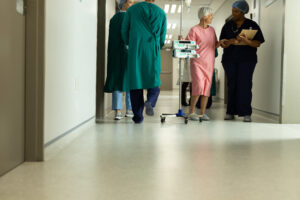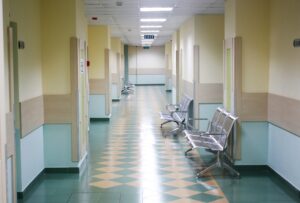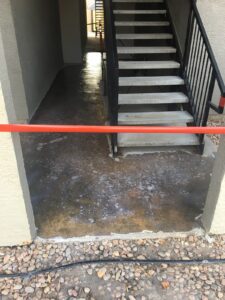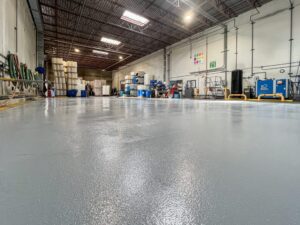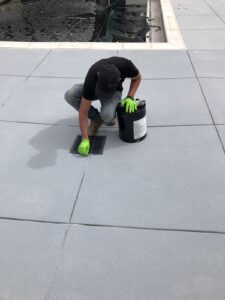BLOG
Concrete is one of the most highly recommended flooring options in the healthcare world. It is often strongly recommended for hospitals and related facilities, with many people pointing to its durability when compared to other materials. Durability is a concern. But those building hospitals often wonder how much of a concern it really is. After all, there are many durable types of flooring. Does concrete really matter this much? Will other types of flooring really become so damaged that it could impact the work at the hospital? How Hospital Flooring Options Hold Up Healthcare facilities are subject to unique and rigorous demands due to their high-traffic nature, stringent hygiene requirements, and the presence of heavy medical equipment. The flooring in these environments must withstand these challenges while maintaining safety and cleanliness. This is something that very few other types of flooring can provide, and while some can offer some support here and there, most of the time, only concrete makes sense as a safe choice: Durability – Healthcare environments experience constant foot traffic from staff, patients, and visitors. The use […]
...READ MOREIn the healthcare sector, the choice of flooring is not merely a matter of aesthetics but a critical component of the overall functionality, safety, and hygiene of medical facilities. At Colorado Concrete Repair, we specialize in concrete and epoxy flooring solutions that meet the unique demands of doctor’s offices and other healthcare settings. The Advantages of Concrete and Epoxy Flooring in Healthcare Settings Concrete and epoxy flooring are often the best choices for medical environments, providing durability, ease of maintenance, and compliance with health standards. Some of the many benefits of this type of flooring include, but are not limited to: Durability and Longevity – Doctor’s offices receive high foot traffic and are subject to the wear and tear of medical equipment and furniture movement. Concrete and epoxy flooring offer unparalleled durability, resisting cracks, chips, and other damage, thus maintaining their integrity over time. Hygienic and Easy to Clean – Hygiene is paramount in healthcare settings to prevent the spread of infections. Concrete and epoxy floors provide smooth, non-porous surfaces that are easy to clean and disinfect. These flooring options […]
...READ MOREHealthcare associated infections (HIAs) are a major concern in facilities like hospitals, emergency rooms, clinics, and senior care facilities. Because these locations often deal with contagious diseases, there can be a significant number of germs present, putting already high risk people in greater danger and compounding health problems. The CDC estimates that approximately 3% of hospital patients contract an HIA per day. These infections often come from contact with contaminated surfaces. Enhanced cleaning is the leading way to prevent HIAs and, as a floor often represents the largest surface in health care facilities, installing an antimicrobial concrete floor can help mitigate infections and make thorough cleaning easier. What Makes Concrete Floors Antimicrobial There are two leading concrete flooring options for facilities that require medical clinic flooring. Polished concrete is one option that uses fine diamond grit sandpaper to achieve a smooth surface and epoxy coating is another option that relies on a resinous epoxy layer applied over a concrete flooring base. Both solutions are durable, attractive, anti-slip, and affordable in addition to being anti-microbial due to the following properties: Non Porous – […]
...READ MOREPharmaceutical facilities have certain requirements and challenges that many other properties do not necessarily face. Concerns about contamination, a clean environment for research and development, and contact with chemicals must be considered when choosing facility design materials, including flooring. Your facility also needs to look professional and is convenient and safe for workers and visitors. Concrete flooring with an epoxy coating is the best choice for pharma manufacturing in Boulder, Loveland, Fort Collins, and other areas around Denver with the potential to meet the needs of pharmaceutical plants and offer additional benefits. Why Use Chemical Resistant Resinous Floors at Your Pharmaceutical Plant The FDA requires pharmaceutical companies to meet a number of standards with their flooring to help maintain a hygienic environment without the risk of contamination. These standards include: Floors that are hard and smooth. Floors you can easily clean and disinfect. An aseptic environment. Low airborne particle counts in clean rooms.pharmaceutical In addition to the naturally smooth surface and easy cleaning capabilities of epoxy floor coatings, this is also the ideal material for meeting the last two of […]
...READ MOREThe number of facilities to house senior populations in Denver, Broomfield, and other locations in the Front Range is on the rise. Senior living facilities are a great way to provide a comfortable living situation with easy access to medical care and entertainment. With many facilities serving as self-contained housing for their residents, fulfilling these different purposes requires the right for flooring. Senior living facility epoxy flooring is a leading solution to meet your requirements for maintenance, professionalism, and – perhaps most importantly – safety, especially in an environment where mobility can be an issue. Senior Living Facility Epoxy Flooring An epoxy coating offers a range of benefits that are well suited to senior care facilities. The various benefits of epoxy flooring that enable it to best meet the needs of senior housing include: Easy Mobility – Epoxy has a completely smooth, non-porous surface. This makes it easy for wheeled equipment like wheelchairs, walkers, and medical equipment to roll smoothly over your flooring. Chemical and Fire Resistance – If there are any medication spills or a fire breaks out in […]
...READ MORE
